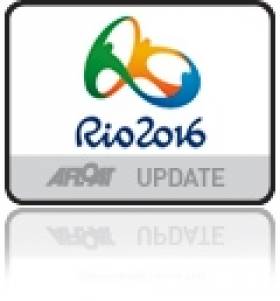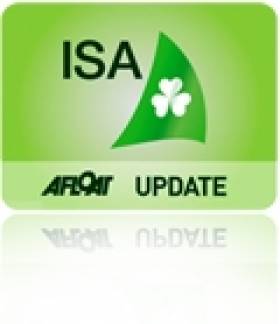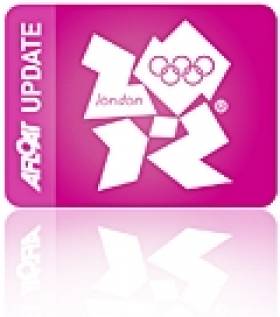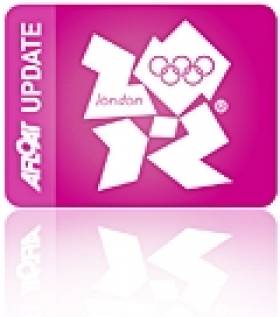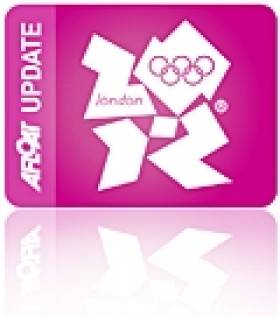Displaying items by tag: Sail for Gold Regatta
#sailforgold – Six Irish sailing teams race tomorrow in the medal races at the Sail for Gold regatta in Weymouth and the forecast will be very much to the Irish team's liking; plenty of wind!
Winds were so strong today that overnight leaders in the 49er skiff class, Ireland's Ryan Seaton and Matt McGovern now head into the medal races with a winning margin.
In the Laser Radial class Annalise Murphy goes into the medal race in third place behind the Chinese girls but the Gold medal is already a foregone conclusion.
The Laser Radial fleet completed two of the three scheduled races, and with a race win - Lilia Xu of China's seventh of the eleven races so far – followed by a third for her efforts today, the 2012 ISAF Rolex World Sailor of the year and Olympic medal winning Xu amassed a 22-point lead at the top of the table to take the Sail for Gold crown ahead of tomorrow’s double points-scoring medal race.
Also qualifying in the radial are Irish youth sailors Fionn Lyden and Finn Lynch.
And in an auspicious start to their Rio 2016 campaign Tiffany Brien and Saskia Tidey make the 49erfx medal race in their first regatta.
#ISA NEWS - The Irish Sailing Association's Olympic Department is inviting tenders for photographic services and social media content for the Irish sailing team at the Sail for Gold Regatta in Weymouth from 4-9 June.
The tender requires attendance at Sail for Gold from Wednesday 6 to Saturday 9 June inclusive.
The photography portion involves daily coverage of Irish sailors racing with a target of 6-10 images per sailor (schedule to be agreed with support team dependant on campaign performance and availability of media boats), plus headshots of the squad and support teams in team clothing, and group shots with and without support teams.
Social media content will involve daily pre-race audio and video with the performance director; daily audio/video with sailors from the media zone; and a micro documentary (3 minutes max) on pieces of interest from an Irish perspective.
Applications for this tender should be emailed to [email protected] by the closing date tomorrow, Friday 13 April 2012. A decision will be made before 20 April to allow time for accreditation and registration for media boats.
Full details on requirements and details of rights and pricing are available on the ISA website HERE.
Update: O'Leary and Kleen Win Gold in Weymouth
Peter O'Leary and Frithjof Kleen have won gold for Ireland this afternoon at the Skandia Sail for Gold Regatta. The Irish -German duo left in their wake a string of world champions and Olympic medallists including Torben Grael, Robert Sheidt and the current Olympic Gold Medallists, Britain's Ian Percy and Andrew Simpson.
Dun Laoghaire's Annalise Murphy who raced in the medal race for the Laser Radial class has finished tenth overall. Results HERE.
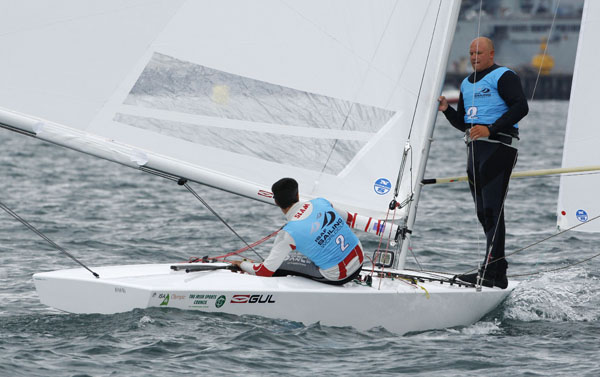
Australia went home laden with gold after an astonishing week of racing in Weymouth Bay – the 2010 Olympic venue. The Aussies picked up gold in four classes; Nicky Souter, Nina Curtis and Olivia Price in the Women's Match Racing, the Skud-18 was won by Daniel Fitzgibbon and Rachael Cox on Friday, Tom Slingsby took gold in the Laser Men, and Nathan Outteridge and Iain Jensen made up the top quartet with a win in the 49er class.
The French team pushed Australia all the way, with three gold medals – Pierre Leboucher and Vincent Garos won the 470 Men, Charline Picon took gold home in the RS:X Women, and in the 2.4mR, it was Damien Seguin who did the business for France. The Dutch team then edged the home nation out of the gold medal table with wins in two classes, Marit Bouwmeester in the Laser Radial and Udo Hessels, Marcel van de Veen and Mischa Rossen in the Sonar. While Team Skandia GBR were left with a single gold, which was Giles Scott in the Finn. The consolation for the most successful Olympic sailing nation of the last three Olympiads was a hatful of silver and bronze – two silver and four bronze.
The venue, Weymouth and Portland National Sailing Academy is the 2012 Olympic venue and it threw everything at the competitors this week – saving the best for last, with a medal race day that was the best of the British summer; wind, rain, calms and even a little sunshine right at the end. The huge entry of 975 sailors from 57 nations spread across 712 boats in 13 classes will go home having learned to expect the unexpected in August 2012.
Ireland Guaranteed Medal in the Star Class Today (Podcast here)
Ireland is guaranteed a medal today at the British Skandia Sail for Gold regatta in the Star class but Peter O'Leary's clean run in the keelboat this week was not without drama yesterday when his crew Fritjof Kleen slipped overboard 300 metres from the finish line.
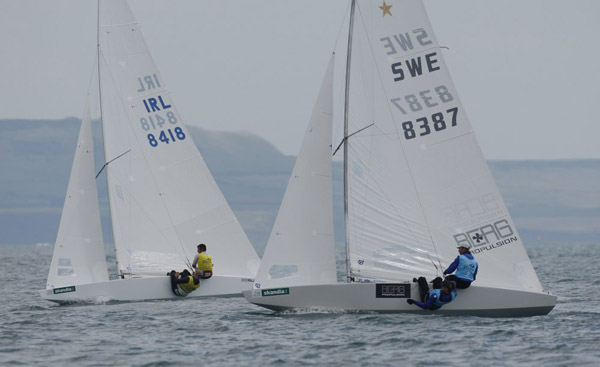
Peter O'Leary and Frithjof Kleen (IRL) against Fredrik Loof and Johan Tillannder (SWE) in the Star class on day 5 of the Skandia Sail for Gold Regatta. Photo: onEdition
Entries Open for Skandia for Gold Regatta
-
Entries for the 2010 Skandia Sail for Gold Regatta are now open, to enter online or download the Notice of Race log onto the event website which is now live at www.skandiasailforgoldregatta.co.uk
The fifth installment of this international regatta takes place between 9th – 14th August at the Weymouth and Portland National Sailing Academy in Dorset. In 2009 the Skandia Sail for Gold Regatta welcomed a record entry of over 600 sailors, the 2010 event is expected exceed this when it will host more than 750 sailors across 10 Olympic and 3 Paralympic classes.
Skandia remains onboard as title sponsor for the event. The Southampton-based long term investment company, which is well known for its support of sailing, has been title sponsor since the event’s inception in 2006. Alongside Skandia, UK Sport has announced their continued involvement as an event partner. This forms part of UK Sport’s World Class Events Programme, which distributes approximately £4 million of Lottery funding each year to support the bidding and staging costs of major events on home soil, as well as providing specialist support to organisers.
Esther Nicholls, Events Consultant for UK Sport, said: “UK Sport is committed to bringing world class sporting events to the UK ahead of 2012, in what we believe will be the most comprehensive pre-Games events programme ever staged by an Olympic host nation. Skandia Sail for Gold 2009 provided not only another invaluable opportunity for British sailors to compete at home, but also a step change in how spectators were able to engage with the event. UK Sport is delighted to be supporting Skandia Sail for Gold for the fifth consecutive year, and we look forward to seeing our athletes gain further knowledge of competing, and hopefully winning, on home waters ahead of 2012, as well as the continued evolution of the spectator experience.”
The Skandia Sail for Gold regatta is one of the biggest events on the 2010 sailing calendar, not only will it give competitors an opportunity to compete on Olympic and Paralympic waters ahead of 2012, but it will also play host to the seventh and final instalment of the 2009/10 edition of the ISAF Sailing World Cup series. Great Britain currently tops the rankings and will be looking to secure the overall title in Weymouth.
Utilising the power of the internet, the event will showcase online technology delivering sailing to a global audience through tracking, live interactive blogs and live radio. The event will be open to the general public who can come down each day to follow the racing onshore, there will be a giant screen broadcasting video and tracking, alongside live commentary.
“This is a crucial event on the calendar, it provides a unique opportunity for teams to compete at the state-of-the-art London 2012 Olympic and Paralympic sailing venue. We intend to bring sailing to the masses through the use of the latest technology and are working alongside Trac Trac and Be Tomorrow to deliver the very best user experience we can for the remote online audience. We will be revealing more extensive details of the tracking capabilities at the event soon,” commented Event Director David Campbell James.
SCHEDULE OF EVENTS
Friday 6th August Event Office opens for registration
Sunday 7th August Briefing for coaches and team leaders
Monday 9th August Racing day 1
Tuesday 10th August Racing day 2
Wednesday 11th August Racing day 3
Thursday 12th August Racing day 4
Friday 13th August Racing day 5
Saturday 14th August Medal Races (no warning signal after 1530)
For the latest news, to enter online and for media accreditation go to: www.skandiasailforgoldregatta.co.uk



























